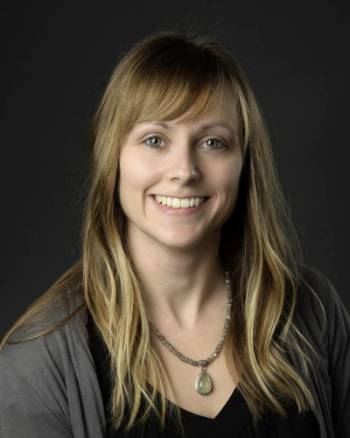Stacey Hancock
Associate Professor, Statistics

Education
-
Ph.D. (Statistics), Department of Statistics, Colorado State University, Fort Collins, CO (2008)
-
M.S. (Statistics), Department of Mathematical Sciences, Montana State University, Bozeman, MT (2004)
-
B.A. (Mathematics and Music), Concordia College, Moorhead, MN (2001)
Research and Projects
"Far better an approximate answer to the right question, than the exact answer to the wrong question, which can always be made precise." John Tukey
My primary research interests lie in statistics and data science education. Research projects in this area include: how students use metaphors and metonymies when learning statistical concepts related to sampling distributions and informal statistical inference, how learning and attitudes towards statistics are affected by one's peers in a flipped-format classroom, and developing and defining data science curricula at the undergraduate and graduate level. I was also previously involved in the MSU Storytelling Group, an NSF grant to bring computer science to rural and American Indian middle school students in Montana through storytelling. Additional research areas include time series analysis, specifically, change-point detection, and statistical applications in ecology.
Selected Publications
- Hill, J., Perrett, G., Hancock, S., Win, L., and Bergner, Y. (2024). Causal Language and Statistics Instruction: Evidence from a Randomized Experiment. Statistics Education Research Journal, 23(1).
- Hancock, S. and Hill, A. (2022). The Effect of Teammate Personality on Team Production. Labour Economics, 78, pp. 102248.
- Hancock, S. (2021). Ask Good Questions: Becoming a Teacher of Statistics. Notices of the American Mathematical Society, 68(3), pp. 365-367.
- Theobold, A. S., Hancock, S.A., and Mannheimer, S. (2021). Designing Data Science Workshops for Data-Intensive Environmental Science Research. Journal of Statistics Education, 29(sup1), pp. S83-S94, published online Mar 22, 2021.
- Fasy, B. T., Hancock, S. A., Komlos, B. Z., Kristiansen, B., Micka, S., Theobold, A. S. (2020). Bring the Page to Life: Engaging Rural Students in Computer Science Using Alice. ITiCSE '20: Proceedings of the 2020 ACM Conference on Innovation and Technology in Computer Science Education, pp. 110-116.
- Hancock, S. A. and Rummerfield, W. (2020). Simulation Methods for Teaching Sampling Distributions: Should Hands-on Activities Precede the Computer? Journal of Statistics Education, 28(1), pp. 9-17, published online Feb 28, 2020.
- Theobold, A., Hancock, S. (2019). How Environmental Science Graduate Students Acquire Statistical Computing Skills. Statistics Education Research Journal, 18(2), pp. 68-85.
-
Hancock, S. A. (2018). Infusing Data Visualization into Intro Stat Using Tableau. In M. A. Sorto, A. White, & L. Guyot (Eds.), Looking back, looking forward. Proceedings of the Tenth International Conference on Teaching Statistics(ICOTS10, July, 2018), Kyoto, Japan. Voorburg, The Netherlands: International Statistical Institute.
-
Davis, R. A., Hancock, S. A., and Yao, Y.-C. (2016). On consistency of minimum description length model selection for piecewise autoregressions. Journal of Econometrics, 194(2), pp. 360-368.
-
"New Undergraduate Data Science Programs" article in Amstat News, 1 July 2015, interview about our new data science major at UCI.
-
Noll, J. and Hancock, S. A. (2014). Proper and paradigmatic metonymy as a lens for characterizing student conceptions of distributions and sampling. Educational Studies in Mathematics, 88(3), pp. 361-383.
Teaching
"The test of a good teacher is not how many questions she can ask her pupils that they will answer readily, but how many questions she inspires them to ask her which she finds it hard to answer." Alice Wellington Rollins
Fall 2025 Office Hours
- In person (Wilson 2-195) - available virtually by request:
- Mondays 9:30-10:30am
- Tuesdays 2:00-3:00pm
- Wednesdays 12:00-1:00pm
- Also available by appointment
Fall 2025 Courses
Past Courses
- Stat 216: Introduction to Statistics
- Stat 401: Applied Methods in Statistics
- Stat 408: Statistical Computing and Graphical Analysis
- Stat 439: Introduction to Categorical Data Analysis
- Stat 502: Intermediate Mathematical Statistics
- Stat 505: Linear Models
- Stat 539: Generalized Linear Models
- Stat 550: Advanced Mathematical Statistics
